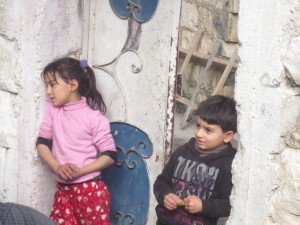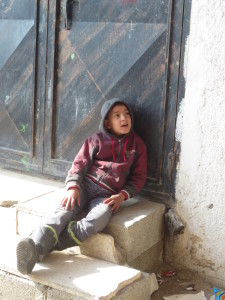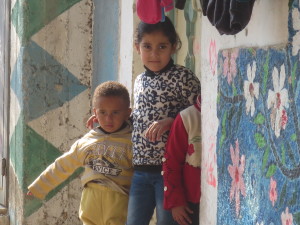The slap of Balata
febbraio 19, 2014 in Palestina, Traduzioni da Anna Zorzi
Written by Sonia Trovato, translated by Anna Zorzi ![]()
Nothing is changing. This is what people in Balata repeat, like an endless refrain. You are in Nablus, one of the most populated towns in the West Bank, but Balata is a town inside the town, with its own mosque, supermarket and school. Balata is a refugee camp, the largest one in the occupied territories of Palestine. It was founded by the UNRWA, the UNO agency created to face the emergency of Palestinian refugees, and named Yafa, after Jaffa, the ancient Arabian city where 75% of refugees come from and today reduced to the artistic counterpart of the more modern Tel Aviv. The camp, unprovided with light, electricity or proper sewerage system for ten years, was built on an area of one kilometer square to lodge 5, 6 thousand people. Now 29 thousand people have found accommodation here, but the camp hasn’t enlarged its extension. The tents which at first were put up have now been replaced by living units, each 3 metres square large. The result is hard life for the people here, who are forced to live in minuscule houses which are heaped up one another and never let any sunlight through. No privacy, no space you are told by the volunteer who shows you this brutal, desolating picture.
You can hardly hold back your tears. On your arrival you noticed frowning, suspicious children around you and you realized that in Balata you wouldn’t find the hopeful combative spirit you saw in Samer Issawi or the kids in Bil’in. Here is only desperation, anger, resignation. Nothing is changing. However, Balata was a showpiece in the Palestinian Resistance, since it started the First Intifada and played a vital role in the Second one too. But the price it paid for these actions was very high: Israel crushed the rebellions, massacred 240 civilians and imposed a one-hundred day curfew. Ibrahim, one of the young men at the meeting, was injured by a 84 mm bullet and was given up for dead. Yet he managed to recover after a month in a coma and two years of rehabilitation. Now he is married, his wife is going to have a baby and he’s become the symbol of the Palestinian struggle for life. But it isn’t enough. It isn’t enough for the young generations not to be aware of what they are sentenced to, that is a sentence passed for the third time, since this is the third generation of refugees in Palestine. It isn’t enough for them not to realize how absurd their present condition is, since they are refugees on their own land and not because of natural calamities or any other sudden destitution. It isn’t enough for them not to realize that all this is the result of a project of occupation with the implicit consent of the whole international community, which, through John Kerry, is domineering in the “peace” negotiations and proposing to send all refugees somewhere remote in Australia or Canada as a possible solution.
–This is the worst time of Palestinian history– the volunteer explains to us. During the Second Intifada it was either life or death. The present situation has reached a deadlock, which is getting worse every day, every hour, every minute: 80% of the refugees in Balata is below the poverty line; unemployment is at 49% and youth unemployment exceeds 70%; food programs have been cancelled recently; the schools, once the best, now are the worst in the West Bank; any health assistance isn’t guaranteed, since only two doctors and a dentist are assigned to a community of 29 thousand people, medicines are fewer and fewer. To make things worse is the reduction of the helps from the UNRWA, weakened by the frequent cuts, the workers’ dismissals and the discredit campaign started by Israel during the Second Intifada. Disillusioned by this hell-like reality, the young look to their parents and grandparents and they realize they are living the same way. There is no chance of making projects for future, there is nothing but boredom and discouragement. Nothing is changing.
In a week three people have been killed for no reason, for nothing. Quarrels end in tragedies (Why are you staring at me? Do you want a fight?), like the brawls outside discos in your country, but with a difference.  Here it’s not spoilt, brawling, bossy kids, they are kids who have nothing and life is nothing to them . They forget we are people and that personal pronoun makes you feel guilty. How many times did you hear the breaking news of tens, hundreds of deaths given by the TV speaker with the same indifference as if announcing the birth of the British royal baby or the love gush of Dudù to his owner, the Cavaliere, and you paid no attention at all, busy to get ready for a night out with your friends? How many times didn’t you stop and think that behind those numbers are families mourning their dead? War is a sad thing, but it’s even sadder that we get used to it, said Tiziano Terzani. And it’s much sadder that the occupation by one of the most powerful army in the world is called “war”. Now you can see those numbers in front of you, in the sad, gloomy faces of those who listen silently or have lived in those claustrophobic units. Those numbers sound like the giggle of the curious children spying you from behind the door and, who knows, hoping you are there to save them. You feel a lump in your throat but you hold back your tears and you think that if those who have been the protagonists of this tragedy for 60 years manage not to burst into tears, then what right have you got to , who are only a spectator?
Here it’s not spoilt, brawling, bossy kids, they are kids who have nothing and life is nothing to them . They forget we are people and that personal pronoun makes you feel guilty. How many times did you hear the breaking news of tens, hundreds of deaths given by the TV speaker with the same indifference as if announcing the birth of the British royal baby or the love gush of Dudù to his owner, the Cavaliere, and you paid no attention at all, busy to get ready for a night out with your friends? How many times didn’t you stop and think that behind those numbers are families mourning their dead? War is a sad thing, but it’s even sadder that we get used to it, said Tiziano Terzani. And it’s much sadder that the occupation by one of the most powerful army in the world is called “war”. Now you can see those numbers in front of you, in the sad, gloomy faces of those who listen silently or have lived in those claustrophobic units. Those numbers sound like the giggle of the curious children spying you from behind the door and, who knows, hoping you are there to save them. You feel a lump in your throat but you hold back your tears and you think that if those who have been the protagonists of this tragedy for 60 years manage not to burst into tears, then what right have you got to , who are only a spectator?
But a sentence strikes you: we love to have a life. Palestinians love to have a life, not to live. To you having means to possess goods, most of the time unnecessary goods,but in Balata, and generally speaking, in Palestine to have means to be. And they don’t mean a beautiful, adventurous , wealthy or daring life. A dignified life would be enough for them.







